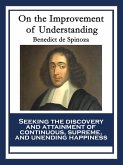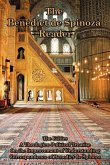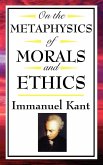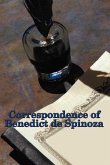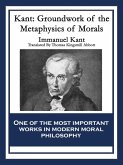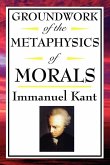Benedict De Spinoza
The Ethics (eBook, ePUB)
1,99 €
1,99 €
inkl. MwSt.
Sofort per Download lieferbar

1 °P sammeln
1,99 €
Als Download kaufen

1,99 €
inkl. MwSt.
Sofort per Download lieferbar

1 °P sammeln
Jetzt verschenken
Alle Infos zum eBook verschenken
1,99 €
inkl. MwSt.
Sofort per Download lieferbar
Alle Infos zum eBook verschenken

1 °P sammeln
Benedict De Spinoza
The Ethics (eBook, ePUB)
- Format: ePub
- Merkliste
- Auf die Merkliste
- Bewerten Bewerten
- Teilen
- Produkt teilen
- Produkterinnerung
- Produkterinnerung

Bitte loggen Sie sich zunächst in Ihr Kundenkonto ein oder registrieren Sie sich bei
bücher.de, um das eBook-Abo tolino select nutzen zu können.
Hier können Sie sich einloggen
Hier können Sie sich einloggen
Sie sind bereits eingeloggt. Klicken Sie auf 2. tolino select Abo, um fortzufahren.

Bitte loggen Sie sich zunächst in Ihr Kundenkonto ein oder registrieren Sie sich bei bücher.de, um das eBook-Abo tolino select nutzen zu können.
Benedict de Spinoza's writings laid the groundwork for the 18th century Enlightenment and for modern Biblical criticism. By virtue of his magnum opus, the Ethics, Spinoza is considered one of Western philosophy's definitive ethicists.
- Geräte: eReader
- mit Kopierschutz
- eBook Hilfe
- Größe: 0.58MB
Andere Kunden interessierten sich auch für
![On the Improvement of Understanding (eBook, ePUB) On the Improvement of Understanding (eBook, ePUB)]() Benedict De SpinozaOn the Improvement of Understanding (eBook, ePUB)1,99 €
Benedict De SpinozaOn the Improvement of Understanding (eBook, ePUB)1,99 €![The Benedict de Spinoza Reader (eBook, ePUB) The Benedict de Spinoza Reader (eBook, ePUB)]() Benedict de SpinozaThe Benedict de Spinoza Reader (eBook, ePUB)1,97 €
Benedict de SpinozaThe Benedict de Spinoza Reader (eBook, ePUB)1,97 €![On The Metaphysics of Morals and Ethics (eBook, ePUB) On The Metaphysics of Morals and Ethics (eBook, ePUB)]() Immanuel KantOn The Metaphysics of Morals and Ethics (eBook, ePUB)1,99 €
Immanuel KantOn The Metaphysics of Morals and Ethics (eBook, ePUB)1,99 €![Correspondence of Benedict de Spinoza (eBook, ePUB) Correspondence of Benedict de Spinoza (eBook, ePUB)]() Benedict de SpinozaCorrespondence of Benedict de Spinoza (eBook, ePUB)1,97 €
Benedict de SpinozaCorrespondence of Benedict de Spinoza (eBook, ePUB)1,97 €![Kant: Groundwork of the Metaphysics of Morals (eBook, ePUB) Kant: Groundwork of the Metaphysics of Morals (eBook, ePUB)]() Immanuel KantKant: Groundwork of the Metaphysics of Morals (eBook, ePUB)1,99 €
Immanuel KantKant: Groundwork of the Metaphysics of Morals (eBook, ePUB)1,99 €![Groundwork of the Metaphysics of Morals (eBook, ePUB) Groundwork of the Metaphysics of Morals (eBook, ePUB)]() Immanual KantGroundwork of the Metaphysics of Morals (eBook, ePUB)0,99 €
Immanual KantGroundwork of the Metaphysics of Morals (eBook, ePUB)0,99 €![What's Wrong with the World (eBook, ePUB) What's Wrong with the World (eBook, ePUB)]() Gilbert K. ChestertonWhat's Wrong with the World (eBook, ePUB)1,99 €
Gilbert K. ChestertonWhat's Wrong with the World (eBook, ePUB)1,99 €-
-
-
Benedict de Spinoza's writings laid the groundwork for the 18th century Enlightenment and for modern Biblical criticism. By virtue of his magnum opus, the Ethics, Spinoza is considered one of Western philosophy's definitive ethicists.
Dieser Download kann aus rechtlichen Gründen nur mit Rechnungsadresse in A, D ausgeliefert werden.
Produktdetails
- Produktdetails
- Verlag: Wilder Publications, Inc.
- Seitenzahl: 156
- Erscheinungstermin: 10. Juni 2015
- Englisch
- ISBN-13: 9781627553377
- Artikelnr.: 39938281
- Verlag: Wilder Publications, Inc.
- Seitenzahl: 156
- Erscheinungstermin: 10. Juni 2015
- Englisch
- ISBN-13: 9781627553377
- Artikelnr.: 39938281
- Herstellerkennzeichnung Die Herstellerinformationen sind derzeit nicht verfügbar.
Benedict de Spinoza; 24 November 1632 - 21 February 1677) was a Dutch philosopher of Portuguese Sephardi origin.[11] One of the early thinkers of the Enlightenment[14] and modern biblical criticism,[15] including modern conceptions of the self and the universe,[16] he came to be considered one of the great rationalists of 17th-century philosophy.[17] Inspired by the groundbreaking ideas of René Descartes, Spinoza became a leading philosophical figure of the Dutch Golden Age. Spinoza's given name, which means "Blessed", varies among different languages. In Hebrew, it is written ¿¿¿¿ ¿¿¿¿¿¿¿. His Portuguese name is Benedito "Bento" de Espinosa or d'Espinosa. In his Latin works, he used Latin: Benedictus de Spinoza. Spinoza was raised in the Portuguese-Jewish community in Amsterdam. He developed highly controversial ideas regarding the authenticity of the Hebrew Bible and the nature of the Divine. Jewish religious authorities issued a herem (¿¿¿) against him, causing him to be effectively expelled and shunned by Jewish society at age 23, including by his own family. His books were later added to the Catholic Church's Index of Forbidden Books. He was frequently called an "atheist" by contemporaries, although nowhere in his work does Spinoza argue against the existence of God.[18] Spinoza lived an outwardly simple life as an optical lens grinder, collaborating on microscope and telescope lens designs with Constantijn and Christiaan Huygens. He turned down rewards and honours throughout his life, including prestigious teaching positions. He died at the age of 44 in 1677 from a lung illness, perhaps tuberculosis or silicosis exacerbated by the inhalation of fine glass dust while grinding lenses. He is buried in the Christian churchyard of Nieuwe Kerk in The Hague.[19] Spinoza's magnum opus, the Ethics, was published posthumously in the year of his death. The work opposed Descartes' philosophy of mind-body dualism, and earned Spinoza recognition as one of Western philosophy's most important thinkers. In it, "Spinoza wrote the last indisputable Latin masterpiece, and one in which the refined conceptions of medieval philosophy are finally turned against themselves and destroyed entirely".[20] Georg Wilhelm Friedrich Hegel said, "The fact is that Spinoza is made a testing-point in modern philosophy, so that it may really be said: You are either a Spinozist or not a philosopher at all."[21] His philosophical accomplishments and moral character prompted Gilles Deleuze to name him "the 'prince' of philosophers.

